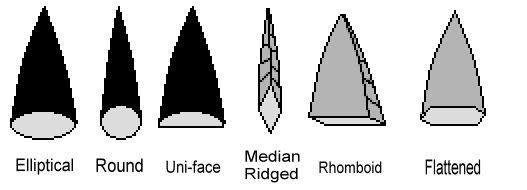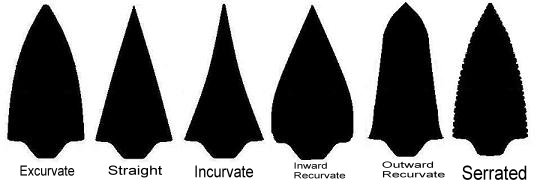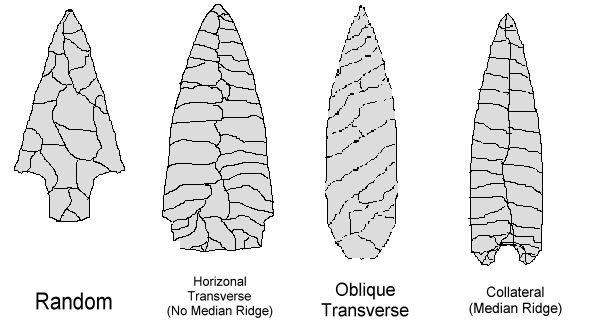Auriculate: Auricle or ears are pointed at an downward angel
Side Notch: Notches enter the body of the point from the blade
creating parallel notches.

Lanceolate: The blade expands out from the tip and
then narrows back in towards the base. This type of
point generally has a straight or concave base.
Stemmed: Stemmed points are further broken down into; Contracting Stem, Straight Stem, and Expanding Stem
Corner Notch: Notches enter the body of the point from the
corner, or where the blade meets the base. This type of
notch generally create a barb.
Stemmed: The stem is relatively straight from the shoulders to
the base.
Expanding Stem: The stem expands from the shoulders to the
base. The difference from a side notch may be stylistic, so if
you are unable to find your point, check side notched points.
Contracting Stem: The stem tappers from the shoulders to the base.
The taper may range from a slight taper to a sharp taper.
Basal Notch: Notches enter the body from the base of the
point. This type of notch has long barbs.
Notched:
Notched points are further broken down into: Side Notch, Corner Notch,
and Basal Notch
Triangle: The blade expands out from the base to the base.
Lanceolate: Lanceolate points are
further broken down into: Articulated, Lanceolate, Leaf, and Triangle

Leaf: also called ovate or egg shaped. This point
expands out from the tip and narrows back in at the base and has a
round base.
Bifurcated: Bifurcated points have a deep center notch in the
base. The overall shape may range from stemmed to notched
points. All bifurcated points have also been included in the
search pages under the overall shape of the point.
Other Shaped Lithics: : This section includes many tools
(drills, knives, scrappers, fleshers, etc.) that are not classified
as projectile points, but are made of the same material.
Other: Other points include
Bifurcated projectile points and other shaped Lithics


